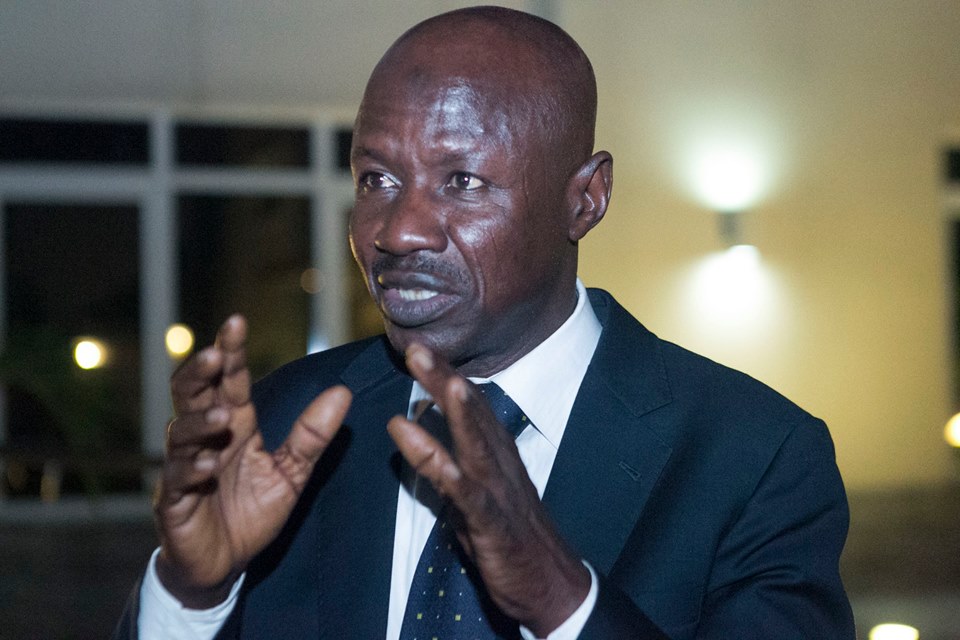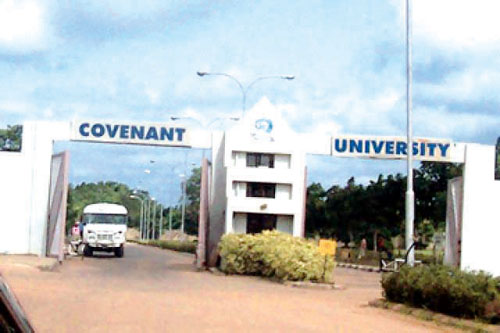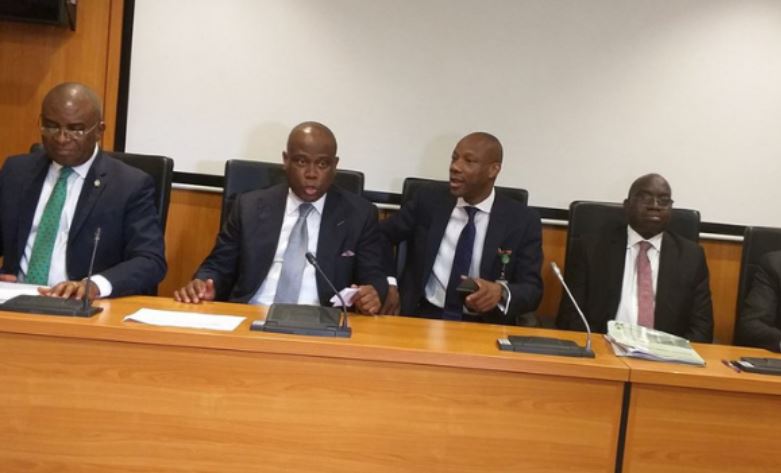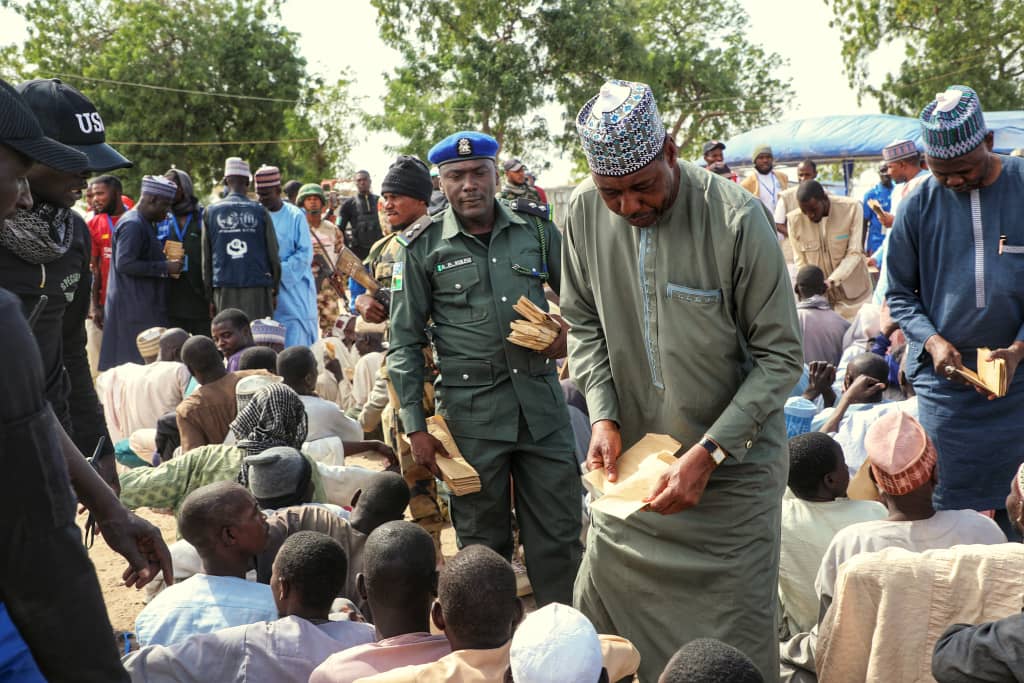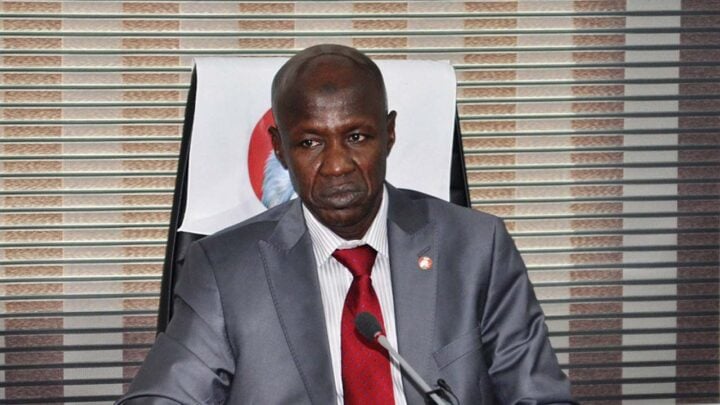Ibrahim Magu, acting chairman of the Economic and Financial Crimes Commission (EFCC), says corruption is worse than coronavirus and other deadly diseases.
Magu said this at the passing out parade of 281 cadets of the EFCC Detective Inspector Course-5, at the Nigerian Defence Academy, in Kaduna, on Tuesday.
He said corruption is an evil that if not tackled would consume the country.
He also said in line with its strategic plan, the EFCC has beamed its searchlight on advance fee fraudsters.
Advertisement
”Your Excellency, corruption is worse than cancer, Ebola-virus, Corona–virus and all other deadly diseases put together. Fighting corruption is thus a crusade against the evils of our society that are deeply-rooted and threatening to consume us,” he said.
“The scourge of the activities of the Yahoo Boys and the consequent dent on our national image motivated EFCC to plan and execute the great push against their nefarious activities, with a determination to flush them out and redeem Nigeria’s National Pride.”
Below is the full text of the speech:
Advertisement
A speech by Ibrahim Magu
The acting executive chairman
Economic and Financial Crimes Commission, EFCC
On the occasion of passing out parade for DIC5
Advertisement
At
The Nigerian Defence Academy Parade Ground, Afaka, Kaduna
February 18, 2020
Protocol
Advertisement
Let me start by expressing my profound gratitude to the President and Commander-in-Chief of the Armed Forces of the Federal Republic of Nigeria, Muhammadu Buharifor giving me the rare opportunity to host him at this special occasion of the Passing Out Parade of EFCC Detective Inspectors Course 5. This is a further indication of Mr. President’s good will and unrelenting support for the fight against corruption. I will hold this day dear to my heart, knowing that your presence here today is one of the strongest motivations for us in the EFCC.
Your Excellency, our mandate at the EFCC is to kill corruption, as you once said:
Advertisement
“if we don’t kill corruption, corruption will kill Nigeria”.
As it is often said, in our country, tackling corruption is a clarion call, given that corruption is a huge burden to the nation. It has spread its cancerous effects to all facets of our lives. Insecurity, poverty, unemployment, falling standards of education, weak access to affordable health care, failing infrastructure, questioned integrity of the electoral process, poor business environment and lower GDP growth to mention a few, are all linked to corruption.
Advertisement
Your Excellency, corruption is worse than cancer, Ebola-virus, Corona–virus and all other deadly diseases put together. Fighting corruption is thus a crusade against the evils of our society that are deeply-rooted and threatening to consume us. We are aware that the task is not easy and the path can be very thorny and lonely, but with determination and a high sense of mission, we are making progress towards rooting out this evil from our society. We all appreciate you as the President of the Federal Republic of Nigeria, for embarking on this mission. Your Excellency, the fight against corruption is a fight that must be won to secure a better future for our generation and the generation yet unborn.
The mission to eliminate corruption in Nigeria assumed a more systematic posture from 2016 with the development of a National Anti-Corruption Strategy and National Anti-Corruption Action Plan which were launched in 2017. The five pillars or core strategies contained are:
Advertisement
• Prevention;
• Public Engagement;
• Ethical Reorientation;
• Institutional Strengthening of Anti Corruption Agencies;
• Enforcement, Recovery and Management of the Proceeds of Corruption.
These strategic pillars have been reflected in the Federal Government’s Economic Recovery and Growth Plan (ERGP 2017 – 2020). The plan seeks to improve governance by entrenching transparency and fighting corruption; reinforcing security; reforming the public service; and strengthening coordination with sub–national governments. The government has been diligently pursuing these core objectives without relenting and with much impact on governance.
The EFCC on its part is currently developing its ‘Statement of Strategy for 2020 to 2025 in line with the 5 pillars of National Anti Corruption Strategy. This was preceded by an earlier strategic plan which was successfully implemented.
Based on your commitment to the National Anti–Corruption Strategy, you approved the recruitment of additional workforce for the Commission to strengthen its capacity in the fight against corruption. Your Excellency, we thank you immensely for this great support.
Additionally, as part of the vigorous pursuit of the enforcement mandate through institutional strengthening, the Commission has created the following new specialized Directorates and Sections, taking into cognisance the changing face of criminality. These include:
• Assets Forfeiture and Recovery Management Directorate
• Forensic and Science Laboratory Directorate
• Anti-Money Laundering and Countering the Financing of Terrorism Section
• Foreign Exchange Malpractice Section
• Forensic Accounting and Fraud Investigation Section
• Cybercrime Section
• Tax Fraud Section
• Procurement Fraud Section
• AMCON Desk
Additionally, the Commission upgraded its Polygraph services by training more professionals and extended its services to sister Law Enforcement Agencies in the country.
The EFCC, with support of development partners has also built one of the best investigative laboratories in West Africa. They are – Digital Forensic Laboratory, Cybercrime Laboratory and Bio-chemical Laboratory. These facilities have aided our investigators and prosecutors in achieving accuracy and deployment of incontrovertible evidence in courts.
Furthermore, Your Excellency, distinguished ladies and gentlemen, we have realized that the fight against corruption requires effective engagement with the public. For this engagement to be effective, 3 communication modalities are essential and need to remain open and active.
• The first is public sensitization and education aimed at information dissemination on the prevalence and dangers of corruption in our society, and how to participate in the prevention of corruption.
• The second mode is that of communicating EFCC’s achievements and activities to the public.
• The third is the interactive mode where feedback from the public can be received and ideas exchanged. These three communication modes relay many of our programmes and activities.
Your Excellency, ladies and gentlemen, I wish to announce that the EFCC Radio is on the verge of a take-off. We thank the President immensely for the support.
In line with its Strategic Plan, the EFCC beamed its search light on Advance Fee Fraudsters, otherwise called 419ners and Yahoo Yahoo boys. The scourge of the activities of the Yahoo Boys and the consequent dent on our national image motivated EFCC to plan and execute the great push against their nefarious activities, with a determination to flush them out and redeem Nigeria’s National Pride.
Your Excellency, I can confidently report to you that as of today, over 500 internet fraudsters have been arrested just within the past 6 months with many havingbeen prosecuted and convicted. Their confidence has been eroded and they are either hiding or on the run. The EFCC will continue to hunt them until their activities are eradicated.
Your Excellency, the EFCC is not satisfied with just prosecuting and jailing these young brilliant Nigerians. Rather, the Commission has concluded plans to reform them, in collaboration with relevant agencies, towards making them better citizens.
One of the greatest feats in the fight against corruption is the increase in the number of successful prosecution of corruption–related cases by the EFCC. In 2015, 103 convictions were secured. By 2016, 195 convictions were recorded. Your Excellency, 314 convictions were recorded in 2018, while over 1,281 convictions were secured by EFCC between January 1and December 31, 2019. I wish to note that the record of convictions in 2018 and 2019 alone is higher than the total convictions secured since the inception of the EFCCin 2003.
Your Excellency, you initiated National Anti-Corruption Strategy, you have implemented a series of institutional and financial management reforms, thus creating an enabling environment for the fight against corruption. You have remained consistent and tenacious to your principle of non-interference in our work, and you have supported us through measures that strengthened the EFCC. This is one of the secrets of our successes.
I dare say that you are indeed a true Champion of the fight against corruption in Africa. We remain grateful andwill continue to remain very loyal.
What also worked for us at the EFCC is the increased level of efficiency and accuracy in investigation, and increased appreciation by the Judiciary of the dire need to fight corruption. Also important is the determined efforts of our operatives, who are further motivated by greater public support. EFCC’s performance will only continue to grow and I am more determined than ever before, given your unflinching support to rid Nigeria of corruption. We have demonstrated that there are no sacred cows anymore. We have successfully prosecuted several high profile cases and many more will come.
Your Excellency, distinguished ladies and gentlemen, I make bold to say that EFCC has indeed come of age. The Commission has expanded its influence in the African Region. The EFCC in collaboration with the anti-corruption agencies of the Republic of Niger, Mali, Chad, Benin Republic, and the Headquarters of the Economic Community of West African States (ECOWAS) organized a two-day regional workshop in Abuja on the theme:“Supporting Good Practices in The Promotion of Legal Migration And The Fight Against Corruption At The Border” in October, 2019. The programme was part of an initiative embarked upon in early February, 2019 by the EFCC in curbing the movement of illicit funds and other trans-border crimes amongst Member States. The process culminated in an operational collaboration and MoU between the EFCC with some West Africa Member States. The Commission has hosted several African countries on study tour and training missions within the past few years. The most recent is the 2 weeks training of officers of the Liberian Anti-Corruption Commission at the EFCC Academy in September 2019. The EFCC is planning to host additional three African countries on training mission.
To our Cadets, I congratulate you on your graduation. You are a unique set to have been reviewed by the President of the Federal Republic of Nigeria. This is an attestation of Mr. President’s commitment to the fight against corruption. I wish to state that while the Cadets will continue to relish this rare privilege, they are expected to demonstrate the highest level of motivation and commitment to the anti-corruption fight. Mr. President, the entire officers and men of the EFCC feel specially favoured by your presence and we promise we will not fail in our determination to win the war against corruption.
Your Excellency, ladies and gentlemen, let me tarry here and introduce to you the maiden edition of The EFCC Digest. It is the newest publication in the Commission’s stable. The articles are specially selected to give readers wider information scope on different areas of the Commission’s operations.
I now present the maiden issue of The EFCC Digestwhich was just unveiled and circulated at this event.
At this juncture, I would like to once again, sincerely thank and appreciate the presence of Mr. President and his entourage and every body present at this occasion. I wish to use this opportunity to appeal to all Nigerians to take ownership of the fight against corruption, because it is a national duty.
Thank you Mr. President. I wish you and everyone present journey mercies as you go back to your different destinations.
Thank you and God bless Nigeria.

